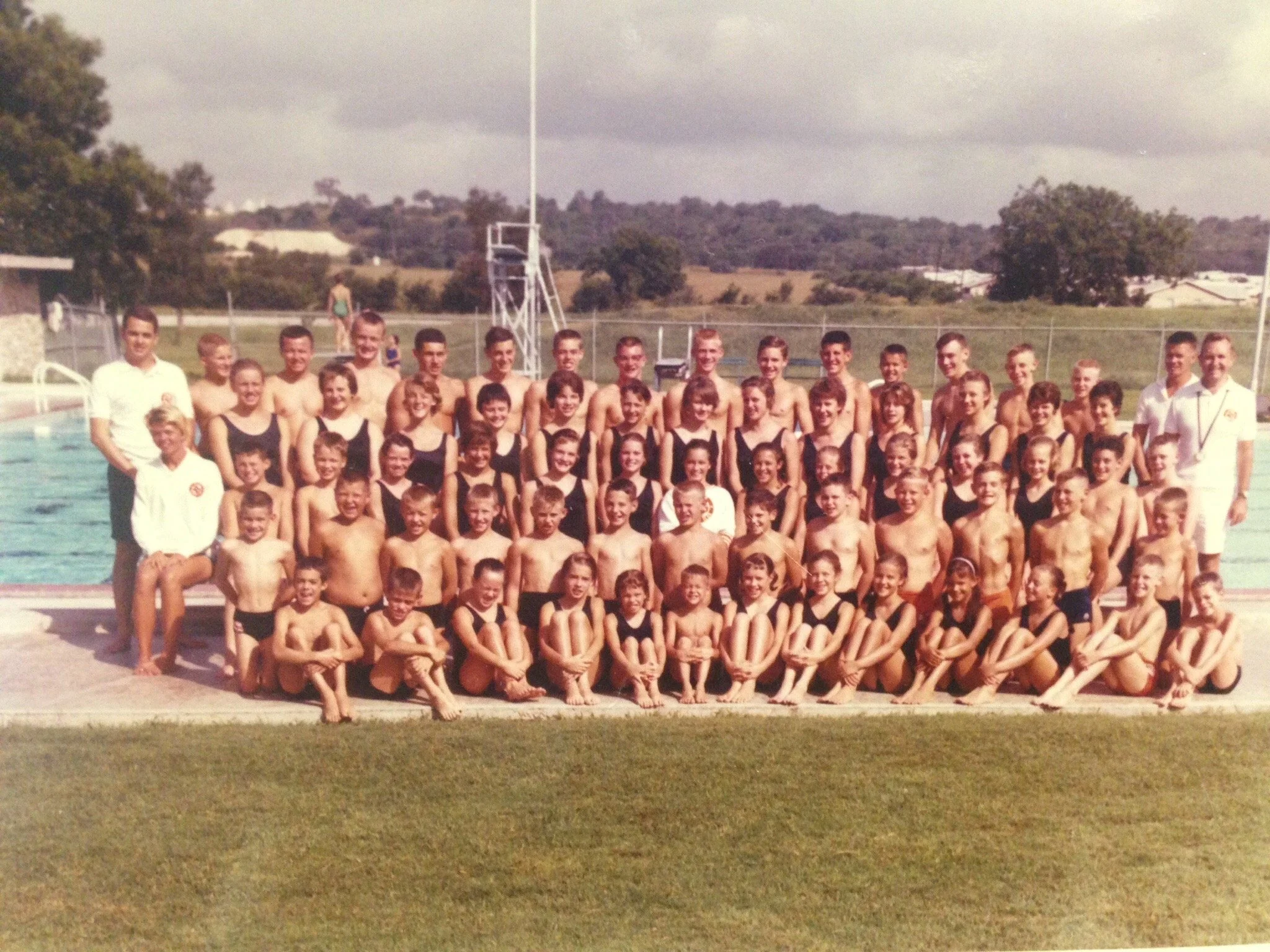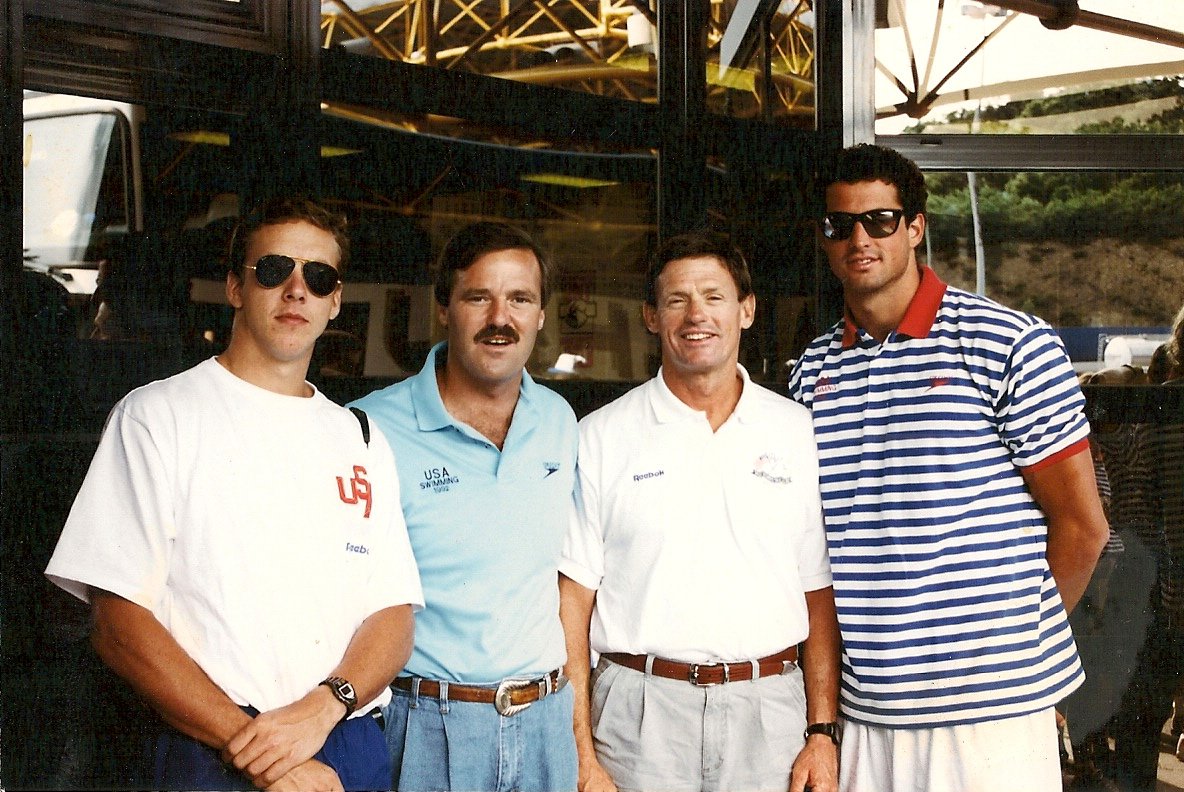Dallas Mustang Swim Team and Dallas Mustang Diving
Dallas, Texas, has been a center for aquatic success since the 1940s, when Wally Hofrichter led the Dallas Aquatic Club. Hofrichter, a University of Texas all-American and TSDHOF honoree, was perhaps the earliest in what became a long line of coaches and swimmers with connections to major programs and success at state, national, and international levels. In 1966 Legendary SMU Coach Red Barr along with Walter Kaspareit started the Junior Mustang Swim Team. In the late ‘60s the team began to truly impact swimming beyond Dallas, and swimmers from each iteration of the Mustang Swim Club have competed at every Olympic Trials since 1968. To this day, there continues to be a close relationship between the club and the SMU women’s and men’s swimming programs. The team became known as the Dallas Swim Club when Richard Quick took the helm in 1971, swimming out of Highland Park High School and SMU pools. Around the same time, the DISD All-Stars swim team was established at the Loos Swim Center. In 1975 the Dallas Swim Club merged with the Fort Worth Swim Club, coached by Pat Hogan, to form one of the largest organizations of its kind at the time: the DFW Swim Team. In 1977 Rick Klatt took over the Dallas Swim Club until the team officially became known as The Mustang Swim Club. Legendary coaches in this time period included George McMillion, Berry Hamilton, Eddie Sinnott, Nancy Nitardy, Vicki Loock Veris and Bob Laura. The mid-’70s brought a name change as Dr. Pepper sponsored the team until 1980. Meanwhile, the DISD All-Stars became the Dallas Aquatic club, coached by Audris Zidermanis (Coach Z) and then Mook Rhodenbaugh in 1989. In 1992 the clubs finally came together. The Mustang Swim Club and the Dallas Aquatic Club merged to form the Dallas Mustangs, with Rhodenbaugh as head coach, who still leads the Mustangs three decades later. The main pools for the team were Loos, Highland Park High School, and SMU. Following the merger, the prominence of the team grew over the following decades, leading eventually to the Dallas Mustangs winning Long Course Junior Nationals overall team champions in 2007. As a result, in the following year the Dallas Mustangs were named a United States Swimming Gold Medal Club, an honor they were given each of the next four years in a row.
NOTABLE SWIMMERS: (Olympians, National Champions, and National Team Members):
1970s: Jerry Heidenreich, Ronnie Mills, John Thorburn, Paul Tietze, John Rubottom, Greg Kraus, Andy Veris, Geoff Gaberino, Kim Dunson, Leslie Crozier, Jim Montgomery
1980s: Steve Lundquist, Guy Goosen, Mook Rhodenbaugh, Mike Heath, Bruce Hayes, Bobby Patten, John Spaulding, John Miranda, Greg Rhodenbaugh, Glenn Mangum, Chris Weissman, Chuck Bauman, Jon Cleveland, Shaun Jordan
1990s: Ryan Berube, Mike Ross, Katie McClelland, Martina Moravcova, Lars Frolander, Robert Musselwhite, Courtney Patterson, Sandra Cam, Craig Jackson, Naoko Imoto
2000s: Matt Thompson, Max Murphy, Candace Blackman, Codie Hansen, Spin Beck, Flavia Rigamonti, Georgina Lee
2010s: Claire Brandt, David Johnston, Alvin Jiang, Nina Rangelova, Mindaugas Sadaskas
OTHER NOTABLE COACHES: Eddie Sinnott, Steve Collins, Greg Warner, Jim Henry, Greg Rhodenbaugh, Doug Moyse, Dorsey Tierney, Christy Shefchunas, Andy Kershaw, Mike Shrader
History of the Dallas Mustang Diving Dynasty
The beginning of Dallas diving history starts with Olympic gold medalist Skippy Browning. David Greig “Skippy” Browning Jr. moved to Dallas with his family in 1941 at the age of ten. A true diving savant and one of the greatest talents the sport has known, he won eight AAU springboard titles for the Dallas Athletic Club, coached by his father, Dave Browning. After one semester at Wayne State University, he transferred to The University of Texas at Austin, where he was a three-year all-American and NCAA champion. He won the 3-meter springboard gold medal at the 1952 Olympics in Helsinki. Browning also famously shimmied up the flagpole to steal the Olympic flag. (American coaches Matt Mann and Mike Peppe had to bail Browning out of jail.) Hailed as a revolutionary in the sport incorporating trampoline training, with mid-air body control unseen at the time, Browning’s life was tragically cut short just before the 1956 Olympics, when his Navy jet crashed on a training run. As the swim programs in Dallas grew in the ‘50s and ‘60s under legendary coaches Red Barr and Richard Quick, so did the diving programs. Ronnie Smith followed in Skippy’s footsteps, winning the 1956 AAU springboard title. Dave Browning continued tutoring diving sensation and TSDHOF honoree, Jim Henry in the ‘60s while at Hilcrest High School. He went on to win five NCAA titles and ten AAU titles at Indiana. In 1972 the Dr. Pepper Company sponsored this new-era team of U.S. national contenders. By 1974 the team became one of the top AAU teams, adopting focused strength training, meditation and kundalini yoga, sporting the new name Nautilus of the Southwest. Led by Texas-born SMU all-American coaches Bryan Robbins and Scott Pyle, and assisted on the deck by Carl, Cal, and Vicki of the famous Loock diving family, the team produced six national champions, a world champion and bronze medalist, two successive FINA world female “divers of the year,” three Olympians, and an Olympic medalist. The team also welcomed Olympic divers from Canada, the UK and Mexico, including three-time Olympian Beverley Boys and Olympic medalist Carlos Giron. The Nautilus team had a tremendous impact on the international sport of diving, introducing cross-training, weight training, ballet, yoga, and other elements that changed the way teams thought about diving. The diving women’s team at the time included included U.S. national team divers of the era such as Cynthia Potter, Janet Ely, Christine Loock, Cindy Riddell, Janet Gabriel, D’Lynn Damron, Andrea Whitelaw, and Michele Hain; and TAGS champions Monique Janette, Becki Burt, Linda McQuerry, and Laura Whitehouse. Great men’s divers at the time included David Bush, Scott Reich, Pat Baker, Keith Ranney, Jay Larew, Steve Jenkins, David Snively, Ricky Tennant, and many more. Among those great men’s divers was TSDHOF honoree Mike Brown. He arrived in Dallas in 1973, working both as a high school math teacher at Skyline High School and as a club diver for Nautilus. Brown would go on in 1976 to become the head diving coach at the University of Texas for two decades. Following the success of Nautilus in the AAU and the growth of SMU at the collegiate level, this Dallas Diving Dynasty became a diving powerhouse known as Mustang Diving under Coach Jim Stillson and age group coaches Michele (Hain) Pappas and Andy Serie. In the late 1980s Michele’s age group program combined with Jim’s senior group under the name Mustangs in the Sun. Outstanding women divers included U.S. national champions Krista Wilson, Paige Weiskittle, Lindsay Long, Jenny Lingamfelter, and Kristin Link. The pair of Link and Long went on to win six platform national syncro titles and represent the United States in several international events. Other notable divers were Cheril Santini and Alexis Gilbert. Outstanding men divers included two-time Olympian and TSDHOF honoree Scott Donie, National champions Brice Dumais and Zeke Crowley and 1996 Olympians Ali Alhasan (Kuwait) and Tony Iglesias (Boliva). Currently the program continues under SMU, head coach Darian Schmidt and Dan Pitts under the name Dallas Metroplex Diving, reflecting the growth of diving in the area. With more than 60 divers it is continuing development in the Dallas area.





































































